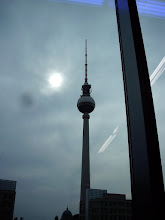Berlin wants to close its doors to the tourist. Barcelona is the past. Since 5 years, It is in Berlin that you have to spend your week-ends. The city, which motto is "sexy and poor" sees its prices for rent increasing and small turkish corners turning into sushi bars. The people of Berlin, and not only die Grüne (local green politicals) accuse tourists to jeopardize their plan : work less to earn less but live better. Outside the fact that the first contact with the German language is hard, and won't dethrone the success of the Spanish language with the 20-25 years old people, Berlin offers the best city trip. You can book the flight for 60,- €, rent a room at my place for 30,-€, eat kebabs even less expensive than in Turkey, dance on the worldwide famous known DJ's sets (but queuing hours long for it), take pictures of the late wall and on Sunday with the rest of your money, if any, buy clothes or anything else at the flea market. Berlin became the 3rd most visited city after London and Paris. I heard that 500 000 tourists are welcome everyday. That was the plan with the jubile of the 20 years' fall of the wall and the mayor expect an increase in the next years. But everyone is not all happy with the wave of easyjetters landing in the city. Take for example in Kreuzberg, the turkish quarter, where number of hotels doubled in 5 years. People living there complain about the incidence of tourism on everyday's life, provoking an increase of the rental price and favorising the marketing of the area. Yet the old "Imbiss" (German snack) looks like a gourmet café or a sushi bar. Eventually, we prefered to see the Turkish coming back from the supermarket than Spanish with their whellcase. Inhabitants complain about the behavior of some young tourists, who do not speak a word of Turkish nor German and have nothing to do with the city, drink all night on the bridge making too much noise. It looks like a zoo, some say. The Green party wanted to create a tourist tax but this is not impossible as long as this tourism is one of the main economical ressource of the city. Berlin has no industry and only lives from service. To understand this, you have to look how the city takes care of its urbanism. After the fall of the wall, East Berlin and some popular quarters like Kreuzberg or mine, Friedrichshain, were abandonned because It was social-economically poor and nobody wanted to invest in them. I remember banks never wanted to invest in my flat because of the bad reputation of my neighborhood. So the urbanism was let free to local population. Very low rent and a lot of free space let opened bars more or less legal, concerts places, galeries, second-hand shops. In this dynamic is born the "arm aber sexy" (poor but sexy) that our Mayor loves to sell abroad. In the meantime, Madonna, Brad Pitt and the jet-setters wanted to be part of it. So the old East quarters became of interest for the rich German from the south of the country and the foreign investors. For the time being stays real estate prices very low compared to the average european price. For a 60 sqm in a area soon hype, be ready to pay 100 000 €. But keep in mind that the price increased already to 16% the last 5 years. Still, some people keep believing in work less to live better. But for how long ? In my area, people accuse the investors to provoke this situation because the rich who came from the West are the only one capable of paying the high rent of the renovated flats. So It's easier to accuse the tourist of all the pain. Whatever say the "Grüne", touristification of the city is on and no point of reverse is to be seen, even if they win the election. Sadly, the government of Berlin abandon its role of regulator regarding the increase of the price of the rent and the risk is big that the private interests soon pervert the estate market here, like It is in most of the european cities.
Subscribe to:
Post Comments (Atom)



No comments:
Post a Comment